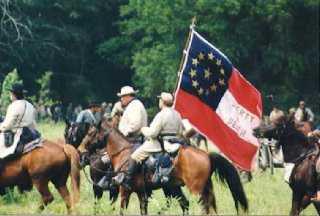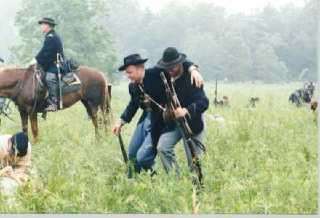|
BATTLE OF
RAYMOND: The Boy Wore Gray by
Severely wounded during the Battle of Raymond, Frank was taken to the Raymond Courthouse where he was nursed back to health. Years later, around 1900, he recorded his memories of the Battle of Raymond.
"While our command was stationed at Port Hudson, La., we received orders to hasten to Raymond, Miss., to assist in checking Gen. Grant's forces which were advancing on Vicksburg. We arrived at Raymond early in the morning of the 11th of May 1863, and next morning was ordered out to relieve a company which had been on picket the night before. Without breakfast, tired, hungry and with blistered feet, sadness was pictured on the faces of my companions as we were hastening on through the dust to the death of some of us and to great suffering of others. But our sadness was suddenly relieved when we saw on a porch of a palatial home some beautiful girls waving the "Bonnie Blue Flag". We gave the old and familiar yell in return, and no sad faces were seen for a while, but on the other hand duty to our Southland and our Southern homes, could be seen pictured on the faces of every member of our company. While on picket we could see our grand old colors, Third Tennessee, moving out to take its place in line of battle. In a very short time General Gregg came up and ordered our Captain to move his company and take our proper place in the regiment. After taking our place in line we could see our skirmishers falling back. This proved to me that we would soon be in a hot engagement.
"Never will I forget the picture of sadness that was on the faces of my comrades, the majority of whom were as still as death. Minutes seemed hours but we were not long in this suspense, for as the Federal skirmishers came in sight our grand old Commander, Col. Walker, stepped out in front and called, 'Attention,' and said, 'We will soon be engaged in a battle and before we begin I wish to say that I do not command you to go, but follow this old bald head of mine' and lifting his cap, gave the command, 'Forward, Guide Center, March.' In the twinkling of an eye sadness and despair vanished an in its place appeared a determination to conquer or die. Onward we went with the rebel yell, driving the enemy back through a cornfield and across a deep narrow creek. Here we were ordered to lie down and continue to fight in this position. "In the last charge which our regiment attempted to make, I was wounded. When I was first struck I supposed I was killed and when I saw the blood running to the ground I was sure it was true. I did not seem to have any great fear of death but what worried me most was the thought of dying so far from home and loved ones. With the assistance of my gun I hobbled to a tree for shelter. Soon one of my comrades came to assist me from the battlefield, but he was seriously wounded before starting with me, so another, a messmate, came to help me and he too was wounded. "Our command was repulsed and in a little while I was captured and sent to the field hospital where my wound was tenderly dressed by a Federal Surgeon. The hospital was at and around the home of Mr. McDonald, a Southern planter and a noble gentleman. Mr. McDonald and his family were allowed one room of their house and the remainder was used by the Federal officers who were wounded. A large arbor was built for the protection of the soldiers from the sun." Young Frank Herron had suffered a severe injury to the thigh. As a result, the field surgeon had to operate and remove two inches of splintered bone. In the fight for his life, Frank found out just how wonderful the citizens of Raymond really were. *Historical source: Reminiscences of the Boys In Gray, 1861-1865, as compiled by Miss Mamie Yeary of McGregor, Texas. Source material discovered by Jeff Gambrione, Old Courthouse Museum, Vicksburg. Photographs by James and Rebecca Drake from the 1998 Reenactment |
||||
|
|

